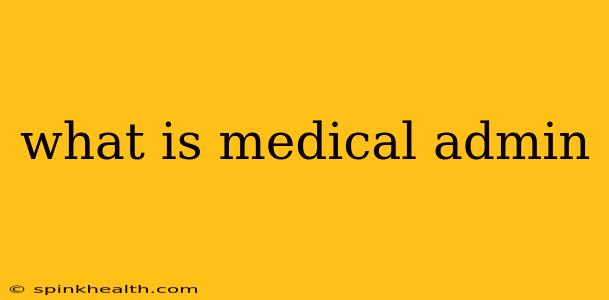What is Medical Administration? A Deep Dive into the Heart of Healthcare
The bustling corridors of a hospital, the steady rhythm of a doctor's office, the quiet efficiency of a nursing home – these are all places where medical administration plays a vital role. But what exactly is medical administration? It's more than just paperwork; it's the lifeblood that keeps healthcare facilities running smoothly and efficiently. It's the unseen force that ensures patients receive the best possible care, and it's a field brimming with opportunity.
Imagine this: a patient arrives at the emergency room, disoriented and in pain. Behind the scenes, medical administrators are already working. They're managing resources, ensuring staff are available, coordinating appointments, and handling insurance claims. They're the unsung heroes, quietly orchestrating the complex symphony of healthcare delivery.
Medical administration encompasses a wide range of tasks, from managing medical records and billing to overseeing personnel and budgeting. It's a field that requires a blend of technical skills, organizational prowess, and a deep understanding of the healthcare industry. Let's delve deeper into some key aspects:
What are the responsibilities of a medical administrator?
This is a multifaceted question, as the specific responsibilities vary depending on the size and type of healthcare facility and the administrator's specific role. However, some common responsibilities include:
- Patient Care Coordination: This involves scheduling appointments, managing patient records, handling insurance claims, and ensuring a smooth patient experience.
- Financial Management: Medical administrators often handle budgeting, billing, and revenue cycle management, ensuring the financial health of the facility.
- Human Resources: This includes recruiting, hiring, training, and managing healthcare professionals.
- Regulatory Compliance: Staying up-to-date on and adhering to healthcare regulations is crucial.
- Operations Management: This involves overseeing the day-to-day operations of the facility, ensuring efficiency and effectiveness.
What skills are needed to become a medical administrator?
Success in medical administration requires a unique blend of hard and soft skills. These include:
- Strong organizational and time management skills: Juggling multiple tasks and deadlines is a daily occurrence.
- Excellent communication skills: Interacting with patients, doctors, nurses, and insurance companies requires clear and concise communication.
- Proficiency in medical terminology and software: Understanding medical terminology and using electronic health record (EHR) systems is essential.
- Problem-solving and critical thinking skills: Medical administrators often face unexpected challenges that require quick and effective solutions.
- Leadership and management skills: Many roles involve overseeing teams and motivating staff.
What education is needed for a career in medical administration?
The path to becoming a medical administrator typically involves obtaining a bachelor's degree, often in health administration, healthcare management, or a related field. Some employers may prefer candidates with a master's degree, especially for higher-level positions.
What is the difference between a medical administrator and a medical assistant?
This is a crucial distinction. A medical assistant provides direct patient care, assisting physicians with clinical tasks. A medical administrator, on the other hand, focuses on the business and operational aspects of healthcare, managing the overall functioning of a facility or department. They don't typically provide direct patient care.
What is the job outlook for medical administrators?
The job outlook for medical administrators is generally positive, driven by the aging population and increasing demand for healthcare services. The Bureau of Labor Statistics projects significant growth in this field.
In conclusion, medical administration is a dynamic and vital field that plays a crucial role in the healthcare system. It’s a career path that offers both intellectual stimulation and the deeply satisfying feeling of contributing to the well-being of others. If you're organized, detail-oriented, and passionate about healthcare, a career in medical administration could be the perfect fit.

